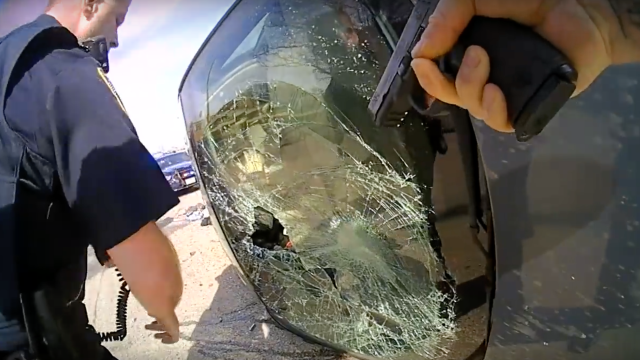On Wednesday, stun gun maker Taser announced that it’s offering free body cameras to every police department in the United States. That’s 700,000 cops across 18,000 departments. Rebranding itself as “Axon” (as in the nerve fibres that connect neurons throughout the human body), the company said in a press release that it’s “going ‘all-in’ to empower police officers” and will offer departments free cameras and storage for an entire year.
Still: YouTube
Here’s what’s in the package:
- One Axon Body 2 camera per sworn officer
- Digital evidence data storage with an Evidence.com “Unlimited Pro” licence
- Two mounts per officer
- Docking station to securely upload body camera footage
- Access to the full Axon Academy online training library
Although trumpeted as tools for accountability and transparency, there are a number of unresolved issues with body cameras and the officers who use them. In the past, officers have claimed cameras serendipitously “fell off”, malfunctioned or powered off just before fatal shootings. And by flooding the entire country with these devices, Axon’s pilot program will only heighten these concerns.
This is a potentially very profitable move. If a police department is given a full year of Axon body cameras, why would they ever switch to another manufacturer? Not only would that involve sending the physical cameras back, but departments would have to adopt totally different software for storage and editing. That’s an enormous hassle and clearly Axon is trying to get departments to sign up for more expensive, multi-year contracts. A five-year contract, for example, can cost upwards of $US800,000 ($1 million). It seems Axon wants to preemptively block competition by acclimating officers to their cameras specifically. Axon’s free camera roll out also prioritises large departments — those with 500 officers or more will get their package as soon as this month, while those with fewer than 75 will have to wait until November. More officers means a more lucrative contract.
Additionally, most US police departments don’t have clear policies about body cameras, such as when footage should be deleted, how quickly police must release footage, and whether or not officers should be able to see the footage before filing a report. This means officers could potentially delay releasing footage (if not block requests outright) or wait until they have seen camera footage, then tailor their reports to the video. There’s no guarantee officers will misuse cameras this way, but without anything on the books preventing it, there’s also no guarantee that body cameras will actually improve officer transparency or accountability.
The US Department of Justice has a well-known federal grant program for departments that want to buy body cameras, awarding officers $US23 million ($30 million) in 2015 and $US20 million ($26 million) in 2016. Crucially, departments applying for federal grants were required to develop policies that specifically outlined how to use the cameras in instances involving domestic violence and juvenile offenders, as well as addressing the concerns of civil rights and victim advocacy groups. There’s no such stipulation for Axon’s trial.
As body cameras get more advanced, scattershot policy will only become a bigger problem. In February, Axon acquired an AI startup, Dextro, prompting concerns about body cameras being used as surveillance tools. Dextro uses object-recognition AI to identify objects in videos at an incredible speed, but critics worry about the effect this could have on policing, seeing it as the next step to integrating facial recognition technology in every day patrolling.
Body cameras may work for some departments and some communities, but a country-wide installation, in only a year’s time, is too heavy-handed to work for each and every department across the US. The potential for misuse abounds and the technology is evolving faster than the policy. It might be a stretch to say Axon’s pilot program is a simultaneous explosion of the police state and the surveillance state, but if there was such an expansion, it would probably look a lot like this.
